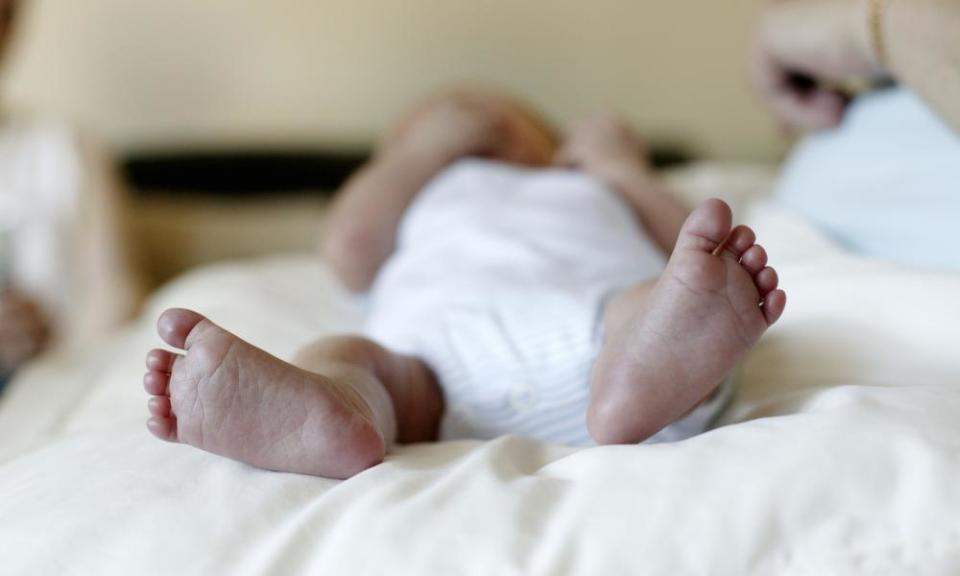Birthrates are falling, but there’s no need to panic

Your editorial seems to think that falling birthrates are a bad thing (The Guardian view on falling birthrates: to parent or not to parent?, 20 September). I respectfully disagree. Several commentators have pointed out that a more equitable distribution of living standards would require the resources of two or more planets to sustain us. The overpopulation of the planet is now the biggest threat to humanity (and the Earth), of which global warming, scarcity of resources and pollution are but symptoms. It is unfortunate that a reducing birthrate leaves us with the problem of an ageing population, but this has to be solved by fairer distribution and a more humane social structure.
Tim Gossling
Cambridge
• Andrew Sparrow’s coverage of the Social Market Foundation’s pronatalism report (British ‘baby shortage’ could lead to economic decline, says thinktank, 20 September) omits the SMF’s acknowledgement of the shortcomings of its own arguments. Panic about the economic effects of demographic ageing is unjustified. Yes, population growth does generally mean GDP growth, but GDP is a poor measure of wellbeing. On the contrary, population decline may exert upward pressure on wages, actually making people better off. And, as the SMF notes, population decline likely incentivises automation, meaning higher productivity. The effects of ageing on public finances hinge on the retirement age, which has hardly budged despite substantial increases in life expectancy. Furthermore, it’s not just old age dependency that matters – children are also dependents.
More importantly, women’s bodies should not be an economic tool for policymakers to manipulate. “Liberal” pronatalism rarely leads to significantly higher birthrates and, as a result, some leaders have turned to reproductive rights violations to coerce women into having more children. The UK government should make childcare, housing and healthcare more affordable, but because it’s obliged to provide for people’s basic needs, rather than in an attempt to increase the fertility rate.
Disappointingly, media discussion about demographic change rarely addresses the environmental impacts. We should be celebrating small families, because they are a crucial component – among others, like decreasing individual consumption – of environmental sustainability.
Monica Scigliano
Researcher, Population Matters
• The fear of a baby shortage is one which other European nations such as Holland are facing. However, the predicted birthrate should not be the only cause for concern. What about the current waste of human potential of our existing children?
While our health, social services and education systems are seriously understaffed and underfunded, many children will fail to thrive. While so many children’s lives are blighted by food and digital poverty, we are failing to raise healthy and productive members of the society of the future. While our government resolutely fails to protect children and teachers in overcrowded classrooms from Covid-19 infection, the risk of long Covid remains.
The government may be short on compassion, but it ought to have a better understanding of the long-term financial consequences and the cost of providing the education that long-term sufferers will need, not to mention the impact on their life chances and capacity to contribute to the economy.
The supply of key workers does not depend on the raw number of working adults. To ensure that we have enough key workers, we need to value their input through better pay, training and working conditions. So let’s worry less about the raw statistics and more about how we can maximise every child’s potential for the future.
Yvonne Williams
Ryde, Isle of Wight
• The Social Market Foundation thinks that the UK needs more people if it is not to go under. So why isn’t it urgently lobbying the government to abandon its “hostile environment” policy for refugees and asylum seekers? After all, if there’s enough room here for more babies, and the adults they’ll grow into, then there’s also enough room for the refugees and asylum seekers we should be welcoming rather than demonising.
Prof Bob Brecher
Brighton
• Have an opinion on anything you’ve read in the Guardian today? Please email us your letter and it will be considered for publication.

 Yahoo Finance
Yahoo Finance 